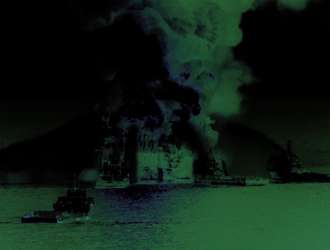The Deepwater Horizon oil rig burns in the Gulf of Mexico after the massive explosion on April 20, 2010. Credit: U.S. Coast Guard
Ed Sherman, a Tulane University law professor specializing in complex litigation, continues to closely monitor the BP Gulf of Mexico oil spill trial in New Orleans, almost three years after the Deepwater Horizon drilling rig caught fire and exploded off the coast of Louisiana.
It may take a year for a ruling to come down on the initial phase of the trial, which ended in April, to determine the liability of the BP oil company and its drilling partners for the explosion and subsequent oil spill.
Sherman says the stakes are high for BP, which spent the lion's share of the first phase of the trial trying to deflect part of the blame for the disaster onto Transocean, which leased the drilling rig to BP, and Haliburton, which laid the cement to cap the well. BP also is fighting the plaintiffs' assertion that it was gross negligence that led to the blowout rather than simple negligence.
A determination of gross negligence could result in a four-fold increase in fines for BP. "That is a very critical factor because billions of dollars rests on that determination," Sherman says. "The government is seeking civil penalties under the Clean Water Act, which sets out damages for every barrel of oil spilled. If it is gross negligence, it would be about $17 billion, and if it's mere negligence, it would only be a few billion."
Regardless of the outcome, Sherman sees such a multifaceted case as a tremendous teaching opportunity for the students in his complex litigations course. His class followed the case closely, had an opportunity to observe the trial and even met with U.S. District Judge Carl Barbier, who took questions and explained aspects of the case.
"This is the perfect example of big, multiparty cases, so it was a nice paradigm for the students to study."
Provided by Tulane University
























